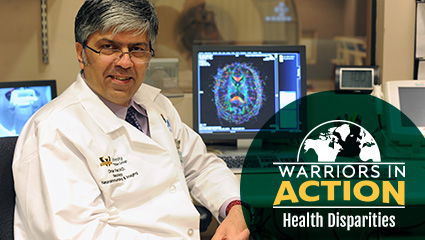Over the coming months, look for videos, stories and events that feature some of the many Wayne State initiatives and passionate individuals committed to eradicating health disparities. This content is part of WSU's Warriors in Action campaign highlighting how Wayne State is making a difference.
Wayne State University is home to Michigan’s largest multiple sclerosis (MS) clinic — one of the five largest in the country. Here, Wayne State researchers and physicians continue to build on their internationally recognized research and treatment for the neurological disorder.
 Dr. Omar Khan, who passed away on Aug. 13 at the age of 53, was the director of the Wayne State MS Research Center and neurologist-in-chief at the Detroit Medical Center. He specialized in the treatment of aggressive forms of multiple sclerosis with chemotherapy and other emerging treatments. With 700 patients, Khan established the largest African-American multiple sclerosis clinic in the United States, where he investigated the role of genetics and treatment of African-American MS patients. Khan also had a keen interest in pediatric MS.
Dr. Omar Khan, who passed away on Aug. 13 at the age of 53, was the director of the Wayne State MS Research Center and neurologist-in-chief at the Detroit Medical Center. He specialized in the treatment of aggressive forms of multiple sclerosis with chemotherapy and other emerging treatments. With 700 patients, Khan established the largest African-American multiple sclerosis clinic in the United States, where he investigated the role of genetics and treatment of African-American MS patients. Khan also had a keen interest in pediatric MS.
Khan had secured more than $8 million in research funding. He served as principal investigator in more than 55 studies and at the time of his death was the principal investigator in more than 15 clinical trials and investigator-initiated studies.
“It is humbling and a privilege to serve the community of MS patients in Detroit,” Khan had said before his passing. “Raising awareness and leading the country in this area of research is very rewarding and in line with the urban research theme of Wayne State University.”
Most recently, Khan had led the development of a new drug treatment for MS patients that was approved by the FDA. The new drug regimen reduces the number of Copaxone injections (the most prescribed MS drug in the world) that patients need by 60 percent — 40mg three times per week instead of daily injections — which significantly improves the lives of millions of MS patients around the world.
In the past few years, the MS Research Center has been developing new imaging biomarkers using advanced brain MRI techniques; detecting disease activity by imaging retina in patients with MS as a potential tool to monitor disease, especially when it involved vision; and developing B-cell targeted therapies that could revolutionize the care of MS worldwide.
Wayne State’s MS clinic treats more than 5,000 patients annually and is the largest center in the world for African-Americans. For more information on how to help advance MS research and treatment for more than 2.5 million patients globally, visit mscenter.med.wayne.edu.
Interested in carrying on Khan's legacy? Students should take summer electives working in the MS Center in the clinic, the retinal biology program in MS, or the Imaging Laboratory which is one of a handful in the United States.